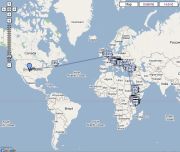Alright, despite the lack of blogging for the past few weeks I've kept up on the reading and rather than trying to write a review for each one, here is a quick break down.
Take Me With You: A Round-the-World Journey to Invite a Stranger Home by Brad Newsham:
An interesting book about a guy who spends three months traveling through developing countries in asia and africa in a quest to pick one local to bring back to the US for an all expense month trip to experience his culture, kind of as a way to show his appreciation for all of the great cultural experiences he's had during his travels. A good, quick read for those that like travelogues.
Through Painted Deserts by Donald Miller:
About a cross country road trip from Texas to Oregon and the lessons in spiritual growth and relationships that are encountered along the way. A bit too 'coming of age' for me, but interesting an insightful none-the-less. But if you're beyond your early 20's you might want to check out 'Zen and the Art of Motorcycle Maintenance' instead.
King Leopold's Ghost by Adam Hochschild:
An amazing and detailed look at the history of the Congo as a colony of King Leopold of Belgium. While I'm generally not big into these 'history' books, this was fascinating, especially after reading 'The Poisonwood Bible' and 'East Along the Equator' which had both briefly touched on the Congo's terrible history. Highly recommended for anyone interested in the history of Congo or Africa in general.
The Prophet Muhammad: A Biography by Barnaby Rogerson:
At sometimes dry, this was a very refreshingly objective look at the Prophet Muhammed's life and the early history of Islam. A quick and easy read, it makes you wonder how things got to where they are today.
We Wish to Inform You That Tomorrow We Will be Killed With Our Families: Stories from Rwanda by Philip Gourevitch:
An amazing look at the history leading up to, including, and after the genocide in Rwanda. At time a difficult book to get through, mental images of which still linger, I would highly recommend this for anyone that has an interest in humanity.
Out of American: A Black Man Confronts Africa by Keith B. Richburg :
Very similar to a book I read before arriving in Africa, 'The Africans' by David Lamb, this is the story of an African American man that moved to Kenya in the early 90s to cover Africa for the Washington Post. What was unfortunate was that despite taking place 10+ years after 'The Africans', nothing much changed other than the names involved in the problems of Africa. The other interesting thing was the difference in perspective that this author had in being a black American in Africa. I was pleasantly surprised by the insight, especially one interesting section which included a high level comparison of the differences in post colonial development between Asia and Africa.
The End of Poverty: Economic Possibilities for Our Time by Jeffrey Sachs:
I didn't quite finish this one. This is one man's view of how poverty can be reduced within the current generation. While good in theory, the crux of which is pour more money into aid, personally I think that's as good as it gets...theory. I've just started 'White Man's Burden' which seems to be a direct response to this books theory...
The Light of Day by Graham Swift:
A pretty worthless novel that seems to be much more about writing style than actual story line. While there were a couple interesting sections, it was largely pretty boring and goes no where. Despite being a booker prize winner I would skip this one.
Hello Africa. Tell Me, How Are You Doing? by Osei G Kofi:
I haven't quite finished this one either, but so far this has been a very different look at the state of Africa, in large part because it comes from an African's perspective and not that of a European of American. One of the most interesting things in this book is the inside front cover which shows two maps of Africa, one with Africa as it is today as well as a pre-colonial map that shows what Africa looked like with all of its tribes before colonialism.
Take Me With You: A Round-the-World Journey to Invite a Stranger Home by Brad Newsham:
An interesting book about a guy who spends three months traveling through developing countries in asia and africa in a quest to pick one local to bring back to the US for an all expense month trip to experience his culture, kind of as a way to show his appreciation for all of the great cultural experiences he's had during his travels. A good, quick read for those that like travelogues.
Through Painted Deserts by Donald Miller:
About a cross country road trip from Texas to Oregon and the lessons in spiritual growth and relationships that are encountered along the way. A bit too 'coming of age' for me, but interesting an insightful none-the-less. But if you're beyond your early 20's you might want to check out 'Zen and the Art of Motorcycle Maintenance' instead.
King Leopold's Ghost by Adam Hochschild:
An amazing and detailed look at the history of the Congo as a colony of King Leopold of Belgium. While I'm generally not big into these 'history' books, this was fascinating, especially after reading 'The Poisonwood Bible' and 'East Along the Equator' which had both briefly touched on the Congo's terrible history. Highly recommended for anyone interested in the history of Congo or Africa in general.
The Prophet Muhammad: A Biography by Barnaby Rogerson:
At sometimes dry, this was a very refreshingly objective look at the Prophet Muhammed's life and the early history of Islam. A quick and easy read, it makes you wonder how things got to where they are today.
We Wish to Inform You That Tomorrow We Will be Killed With Our Families: Stories from Rwanda by Philip Gourevitch:
An amazing look at the history leading up to, including, and after the genocide in Rwanda. At time a difficult book to get through, mental images of which still linger, I would highly recommend this for anyone that has an interest in humanity.
Out of American: A Black Man Confronts Africa by Keith B. Richburg :
Very similar to a book I read before arriving in Africa, 'The Africans' by David Lamb, this is the story of an African American man that moved to Kenya in the early 90s to cover Africa for the Washington Post. What was unfortunate was that despite taking place 10+ years after 'The Africans', nothing much changed other than the names involved in the problems of Africa. The other interesting thing was the difference in perspective that this author had in being a black American in Africa. I was pleasantly surprised by the insight, especially one interesting section which included a high level comparison of the differences in post colonial development between Asia and Africa.
The End of Poverty: Economic Possibilities for Our Time by Jeffrey Sachs:
I didn't quite finish this one. This is one man's view of how poverty can be reduced within the current generation. While good in theory, the crux of which is pour more money into aid, personally I think that's as good as it gets...theory. I've just started 'White Man's Burden' which seems to be a direct response to this books theory...
The Light of Day by Graham Swift:
A pretty worthless novel that seems to be much more about writing style than actual story line. While there were a couple interesting sections, it was largely pretty boring and goes no where. Despite being a booker prize winner I would skip this one.
Hello Africa. Tell Me, How Are You Doing? by Osei G Kofi:
I haven't quite finished this one either, but so far this has been a very different look at the state of Africa, in large part because it comes from an African's perspective and not that of a European of American. One of the most interesting things in this book is the inside front cover which shows two maps of Africa, one with Africa as it is today as well as a pre-colonial map that shows what Africa looked like with all of its tribes before colonialism.








No comments:
Post a Comment